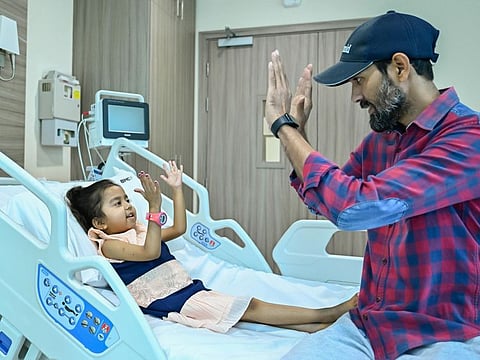Watch: Dad in Abu Dhabi donates liver to save second daughter after losing the first
Indian expat, 40, enables first living donor pediatric liver transplant in the UAE

Abu Dhabi: An Abu Dhabi-based dad, who lost his first daughter to a rare liver condition, has donated his liver to save the life of his second daughter who suffered from the same disease.
Imran Khan, 40, who works as a trading officer with an agricultural company, told Gulf News he feared the loss of his second daughter, Razia Khan, 4, after his first daughter, Shaina, died of a genetic liver condition called Progressive Familial Intrahepatic Cholestasis type 3 (PFIC) when she was four years old.
PFIC is a disorder that causes progressive liver disease, typically leading to liver failure due to build-up of bile in the liver cells.
“Although Shaina was diagnosed with the condition when she was one and a half years old and we were thinking of a liver transplant, she suffered from internal bleeding and passed away before it could be done,” said Khan.
He recalled how Razia too started exhibiting symptoms of PFIC like yellow eyes, gum bleeding and extreme tiredness when she was as young as three months old. His worst fears came true when the PFIC diagnosis was confirmed. Doctors treated her with medication and advised routine check-ups till she was old enough for a liver transplant. In the meantime, her movements remained restricted and she could not attend nursery school.
How a living donor liver transplant works
In a living-donor liver transplant surgery, a portion of the liver from a healthy living person is removed and placed into the patient whose liver does not work well. The donor’s remaining liver regrows and resumes its normal size, volume and capacity within two-three months after the surgery. The transplanted liver portion also grows and restores normal liver function in the patient.
Dr. Rehan Saif, Director, Transplant Surgery for Burjeel Abdominal Multi-Organ Transplant Programme, Clinical Lead HPB Surgery, Consultant General Surgery, said, “Razia’s condition is caused due to a genetic mutation, which leads to an abnormality in the formation and secretion of bile components and bile acids, ultimately leading to damage to the liver. It presents in infancy and early childhood as signs of growth failure and complications of liver failure. The only definitive and curative treatment for these children is liver transplantation.”
Khan was more than ready to step in. “We didn’t explore any donors from outside, although many in our family were willing to come forward. I was found to be a match, and as a father, I decided to do this for my child,” he said.
The transplant team at BMC, led by Dr. Saif, successfully performed simultaneous donor and recipient surgeries, which lasted 12 hours.
In a living-donor liver transplant surgery, a portion of the liver from a healthy living person is removed and placed into the patient whose liver does not work well. The donor’s remaining liver regrows and resumes its normal size, volume and capacity within two-three months after the surgery. The transplanted liver portion also grows and restores normal liver function in the patient.
Other members of the team included Dr Johns Mathew, Abdominal Transplant and Hepato-Pancreatico-Biliary Surgeon; Dr. Gourab Sen, Consultant General Surgery (Specialized in Hepatobiliary and Abdominal Multi-Organ Transplant Surgery); Dr. Ramamurthy Baskaran, Consultant Anesthesiology & Transplant Anesthesia, and team; Dr. Kesava Ramakrishnan, Consultant Pediatric Intensive Care Unit, and team; and Dr. Shyam Mohan, Pediatric Radiologist.
“This is a monumental achievement for the UAE’s medical community.I t ensures that children like Razia can receive life-saving treatments without the need to travel abroad. We are proud to have reached this milestone and look forward to helping more families in the future,” said Dr. Saif
According to the doctor, Razia has made an excellent recovery from her life-saving liver transplant and will be on regular follow-up. Her physical and intellectual development will return to normality with an improved quality of life. She will also be able to start school and enjoy her childhood like any other child her age.
The case is believed to the first living donor pediatric liver transplant in the country.
“I feel blessed that I could do something for Razia. I am very thankful for the doctors who made it happen,” said Khan, adding that his third child, a son, now seven years old, is thankfully normal.
Sign up for the Daily Briefing
Get the latest news and updates straight to your inbox



